|
|
|
Sort Order |
|
|
|
Items / Page
|
|
|
|
|
|
|
| Srl | Item |
| 1 |
ID:
129558
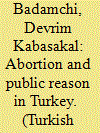

|
|
|
|
|
| Publication |
2014.
|
| Summary/Abstract |
During May and June 2012, the question of abortion was hotly debated in Turkish public forums. This paper analyzes the main characteristics of this abortion debate using John Rawls's conception of public reason as a normative framework. In doing so, speeches and declarations on abortion made by legislators are critically evaluated. The arguments in the debate are examined with a view to interpret how the issue should be discussed as far as the demands of public reason are concerned. From a Rawlsian framework, it is observed that the pro-ban position (Adalet ve Kalk?nma Partisi) is far from contributing to a reasonable balance of political values on abortion whereas the contra-ban position (Cumhuriyet Halk Partisi) satisfies the demands of public reason. Moreover, it is argued that, the latest proposed legislation on abortion cannot be viewed as an outcome of a reasonable balance of political values but is rather an outcome of pragmatic compromise.
|
|
|
|
|
|
|
|
|
|
|
|
|
|
|
|
| 2 |
ID:
133647
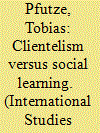

|
|
|
|
|
| Publication |
2014.
|
| Summary/Abstract |
Most research on the effects of international migration on democratic institutions in sending countries focuses on how emigration changes the civic and democratic values of those left behind. Little attention has been given to how the additional income provided by migrant remittances alters the incentive structure of the political actors involved and how this will affect political outcomes. This paper develops a voting model that accounts for the effect of higher income through remittances and shows that its expected effects on voter turnout patterns differ in important ways from those of improved civic values. Taking these predictions to the data, it is shown that, for the case of Mexican municipal elections over the year 2000-2002 period, the empirical evidence strongly supports the notion that international remittances had a positive effect on electoral competitiveness in Mexico by reducing the clientelistic power of the formerly dominant state party (Institutional Revolutionary Party). This result is robust to the use of instrumental variables.
|
|
|
|
|
|
|
|
|
|
|
|
|
|
|
|
| 3 |
ID:
121057
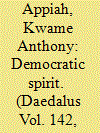

|
|
|
|
|
| Publication |
2013.
|
| Summary/Abstract |
There is a famous paradox about democracy: most forms of participation make no obvious difference to political outcomes and yet people act anyway. I argue that they are more likely to act politically if they have certain attitudes and commitments; and that productive attitudes of the right kind can be sustained by a culture in which two kinds of honor are central. One kind of honor is collective: it is the honor of nations, which is the concern of the patriot. Another is the honor of citizens, who are worthy of respect because they contribute to the practices that serve the republic. I suggest some practices we Americans might want to take up and honor for the sake of our own republic today, drawing attention to two discoveries in social psychology that could be productively brought to bear in our political life: namely, the Ben Franklin effect and the Contact Hypothesis.
|
|
|
|
|
|
|
|
|
|
|
|
|
|
|
|
| 4 |
ID:
150102
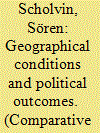

|
|
|
|
|
| Summary/Abstract |
Geopolitical research is frequently pictured as a dead end. This article aims to revitalize geopolitics, reflecting both on the critique of the subject and the strengths that have marked it for more than a century. It is argued that geographical conditions constitute a set of opportunities and constraints, a structure that is independent of agency. General patterns and long-term processes can be explained well by this structure. Understanding specific phenomena that occur in international relations requires taking into consideration non-geographical factors, though. All those committed to geopolitics should hence concentrate on the interplay of geographical conditions and non-geographical factors in causal mechanisms that shape international relations.
|
|
|
|
|
|
|
|
|
|
|
|
|
|
|
|
| 5 |
ID:
120868
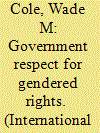

|
|
|
|
|
| Publication |
2013.
|
| Summary/Abstract |
Using two-stage least-squares regression models, I analyze the effect of the Convention on the Elimination of All Forms of Discrimination against Women (CEDAW) on rated levels of respect for women's rights. The results show that CEDAW has a strong positive effect on women's political rights, no effect on economic rights, and a partially negative effect on social rights. Detailed analyses of political outcomes reveal that CEDAW membership was associated with an increase in the share of women in national parliaments but had no effect on the likelihood that governments adopted legislative quotas guaranteeing female representation in parliament. CEDAW was also more effective for some kinds of countries than others. Post-ratification improvements were particularly strong in democratic countries and countries with extensive linkages to women-focused international organizations, but CEDAW proved ineffective in Muslim polities and societies. The paper evaluates the implications of these findings and proposes new avenues for research.
|
|
|
|
|
|
|
|
|
|
|
|
|
|
|
|
| 6 |
ID:
118158
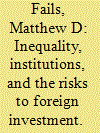

|
|
|
|
|
| Publication |
2012.
|
| Summary/Abstract |
Income inequality is frequently given a central role in explaining diverse political outcomes, but the specifics of how, when, and under what circumstances inequality really matters are far from clear. This paper addresses these questions by examining whether greater levels of inequality raise the risk of expropriation associated with foreign investment. The results demonstrate that inequality matters in two distinct ways. First, inequality elevates risk, although consistent with the argument developed herein, the effect is strongest when chief executives face high constraints on their decision making. Second, inequality mitigates the otherwise protective influence of political institutions on the risk of expropriation. The findings are robust across a variety of estimation strategies, including instrumental variable procedures that correct for error in the measurement of inequality. The findings provide new insights regarding the determinants of foreign investment while simultaneously resolving one part of the contested literature describing inequality's role in the political economy of development.
|
|
|
|
|
|
|
|
|
|
|
|
|
|
|
|
| 7 |
ID:
131326
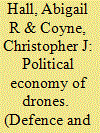

|
|
|
|
|
| Publication |
2014.
|
| Summary/Abstract |
This paper provides a political economy analysis of the evolution of unmanned aerial vehicles (UAV), or 'drones' in the USA. Focus is placed on the interplay between the polity and private economic influences, and their impact on the trajectory of political, economic, and military outcomes. We identify the initial formation of the drone industry, trace how the initial relationships between the military and the private sector expanded over time, and discuss present relationships. Understanding the historical evolution of UAV technology, as well as the major players in the industry today, is important for ongoing policy debates regarding the use of drones both domestically and internationally.
|
|
|
|
|
|
|
|
|
|
|
|
|
|
|
|
| 8 |
ID:
133813
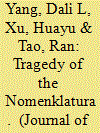

|
|
|
|
|
| Publication |
2014.
|
| Summary/Abstract |
We review James Kung and Shuo Chen's study, published in the American Political Science Review, on the causes of China's Great Leap Famine (1959-1961). Kung and Chen explain the variations in provincial leaders' radicalism on the basis of the career incentives facing the provincial First Secretaries. In this article, we question the validity of their basic assumptions and also uncover serious issues with the Kung and Chen dataset. We conclude that their empirical findings were based on faulty foundations. Our alternative hypothesis instead explains the dynamics of political radicalism during the Great Leap Forward in terms of the provincial leaders' political loyalty to Mao. Our findings point to the significance of political networks in influencing the behavior of elites and, by extension, political and socio-economic outcomes.
|
|
|
|
|
|
|
|
|
|
|
|
|
|
|
|
| 9 |
ID:
174711
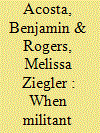

|
|
|
|
|
| Summary/Abstract |
The literature on political violence emphasizes two main ways that militant organizations ‘win’: eliminating the adversary outright or coercing the adversary into making concessions. While most do not win in this way, some organizations that fail to win go on to achieve their goals in post-conflict political competition. What explains variation in the post-conflict political success of militant organizations that did not achieve their organizational goals on the battlefield? In this study, we run the first large-n empirical analysis of the phenomenon. Our empirical results show that organizational size and wartime lethal capacity positively predict the political success of militant organizations that did not win on the battlefield. Other plausibly related features of militant organizations, such as their united wartime front or coherent ideology, do not predict eventual political success. Additionally, we investigate the case of Frente Farabundo Martí para la Liberación Nacional in El Salvador and present marginal effects analyses—further illustrating the effects of a legacy of violence and organizational size on post-conflict political success.
|
|
|
|
|
|
|
|
|
|
|
|
|
|
|
|
|
|
|
|
|